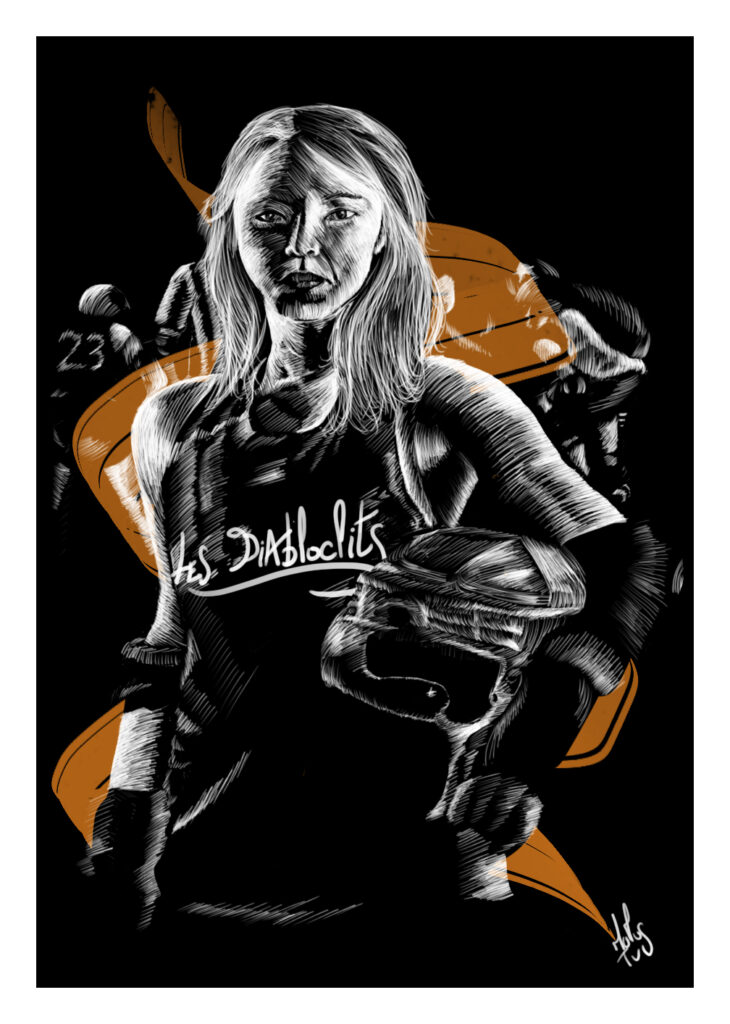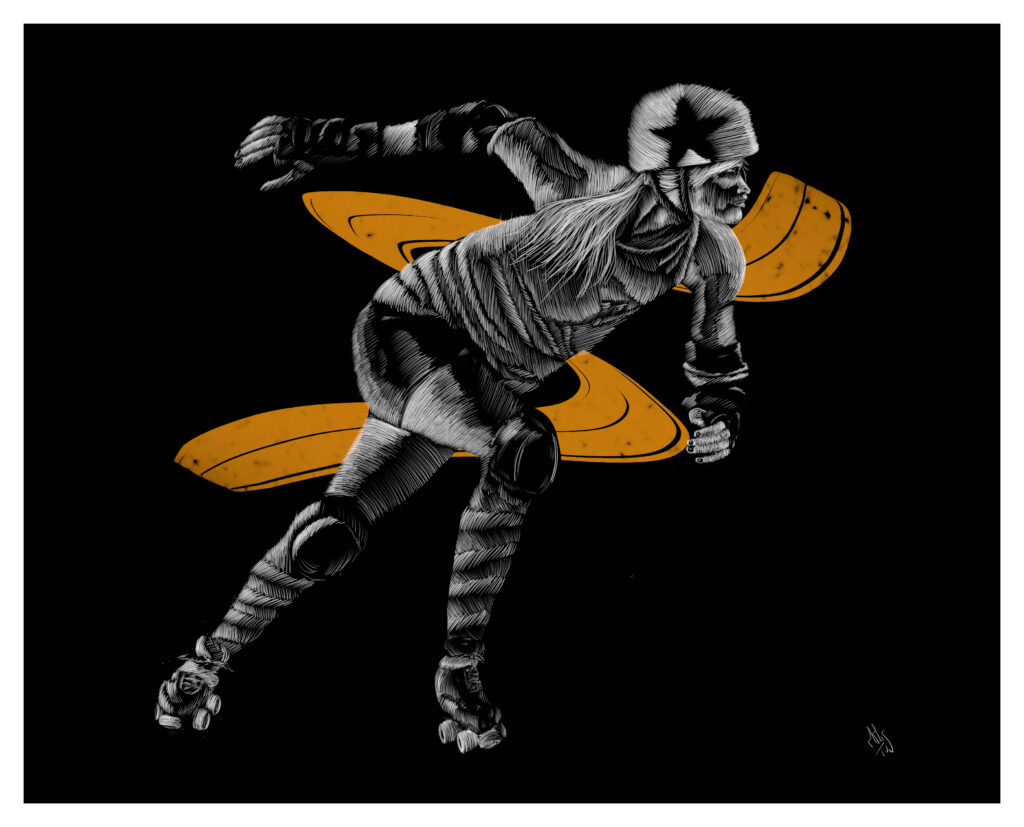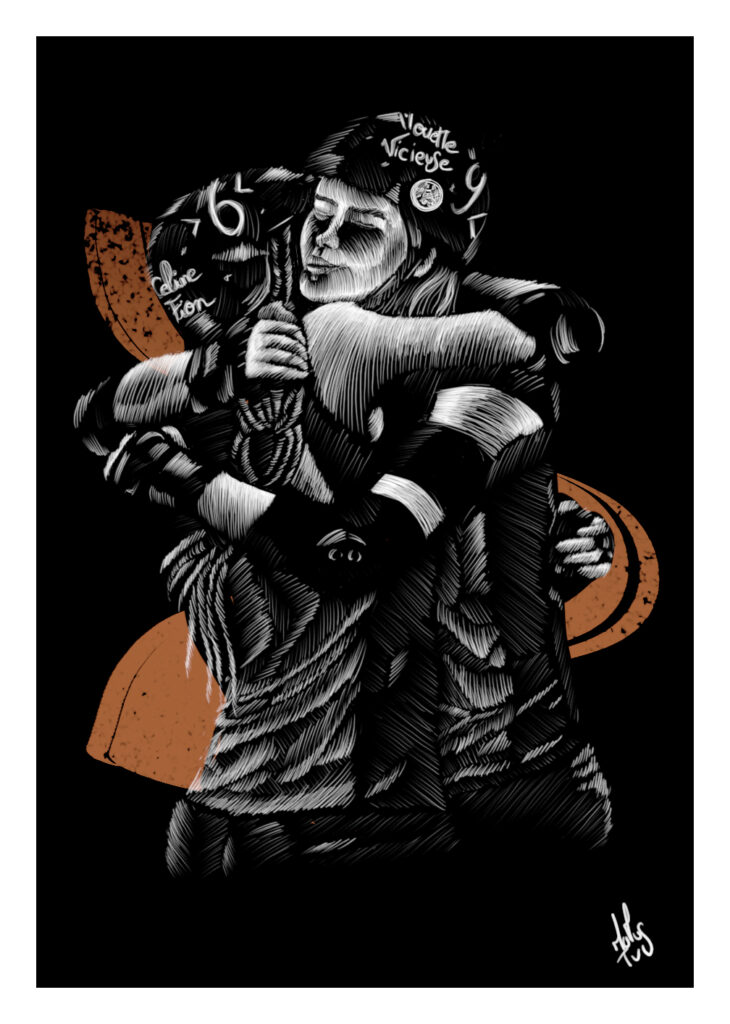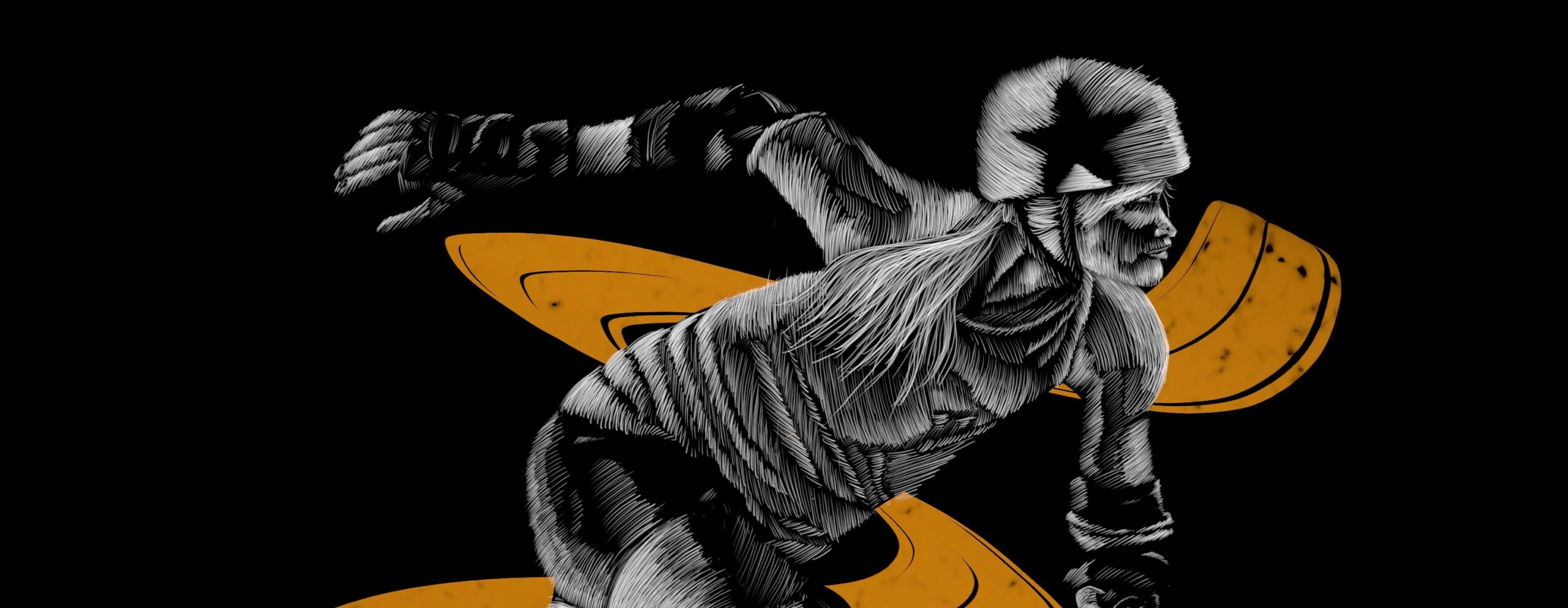

Facing the mirror, a faint light flashes on the reflection of her glittery face. The locker room neon doesn’t look quite in shape today.
Like Sam.
She stares at that melancholy blue gaze, which almost blends in with that ocean of dark circles that spread out under her eyes. It must be said that yesterday, the girls were not very smart. Staying over at their opponents’ houses for today’s match, the Baraques à Tits (Tits Van), they spent the day in preparations.
But that was before drinking like a fish, as Céline Fion (Céline Butt), the Canadian French of the team with a formidable butt kick on the ground, would say.
Article & Illustrations by Momo Tus

She smiles as she thinks of Mouette Vicieuse (Vicious Seagull), their captain, who has sprawled lengthwise while slipping on cake batter on the floor. An uncontrolled split, buttocks on the ground, and a new bruise has been added to her collection of a particularly unworthy player on the “track”, the field.
Her specialty: arriving from behind, and hitting, as she does not yet know how to skate very well.
However, Mouette Vicieuse often tends to attempt prohibited moves to end up on the bench of the punished: the “jail”.
Samantha has never been there. She is the pivot, the thinking head. She guides the strategy so that the team can clear a path for their attacker, the “Jammer”. The latter must double the opposing wall of four players, the “pack”, as many times as possible during a two-minute “Jam”.

One last look in the mirror. This is the first time she’s worn this jersey. Dressed all in black, with red bands on the sides in the colors of the Diabloclits (Devilclits), she feels proud. The uniform jersey and the almost absence of folkloric accessories, she likes it: it’s a way for the girls of the team to establish their legitimacy and the professionalization of this sport in the face of the image of “American show” long anchored in the representations.
Gone are the mini-shorts with sequins, the rainbow knee pads and the fishnet stockings cut by mismatched socks from “Fresh Meat“. The beautiful era when, innocent of violence, she was still nurtured by her Derby-godmother in learning the eighty pages of particularly complex rules.
The head rocks a little, but you have to go. She may not have a hell of a gouache but she has a heavyweight temper. She grabs her protections and her quads – the four-wheeled skates – and patiently criss-crosses her laces. Fortunately, she changed the wheels the day before, the floor of this gymnasium looks particularly dilapidated. Due to the lack of recognition of Roller Derby, waxed concrete that sticks and squeaks remains a privilege.
Once put on her helmet proudly displaying “Raie-manta” (Ray-manta) – her long arms allowing her to protect herself on the sides -, she is then ready to break mouths, and tufts. Every time you leave the locker room, the same feeling. To be another person. She is no longer Samantha, the accountant. A particularly founding benevolence of this community, where each member must feel protected and must be able, if he or she wishes, to show a part of oneself that a daily life does not necessarily accept.
Initially created by women for women, the Roller Derby nevertheless advocates values of inclusivity, regardless of age or morphology, gender or sexual orientation. However, it is these values that clash with those of sports institutions – and the world as a whole. Here, it is the collective spirit that counts and trust, beyond performance.

Sam finally arrives in the room, the gymnasium is in turmoil. In the wake of the militant feminist heritage and American punk culture from which this sport stems, self-management is the key word: everyone pitches in. It’s swarming everywhere. Sylvie Stallone is mopping up old sticky stains, while the Baraques à Tits girls are tinkering with a track with rope and tape.
It wiggles to old punk rock sizzling from the speakers, while Marguerite Furax (Mad Marguerite) splashes herself with foam while testing the beer tap.
Self-coaching, self-financing… independence is the spearhead among the girls, which seals this special friendship regardless of the color of the jersey.
A group is already starting to do “off-skate” on the side of the track, stretching exercises without the skates. The thigh muscles tense with each movement, just like the eyes of the players, ready to fight. The result of intensive training, more than four hours a week. Sitting at the edge of the field, Sam sees the room filling up on the small makeshift bleachers, but the crowd remains modest.
Roller Derby not being recognized by the Ministry of Sports, it often ends up at the bottom of the list. Town halls are chilly. Training is often improvised in parking lots. When a room is finally obtained, the slot complicates the organization. Sunday morning, 9 a.m.
While waiting for things to move, some are getting organized and finding other solutions, such as the Nantes Derby Girls, who have managed to set up their own track in a hangar.

The whistle sounds: the music stops. The few supporters huddled around the merchandising table – to self-finance events and travel – return to their places. The five players from each team begin to position themselves on the track. Sam quickly puts on his mouth guard around which his jaw tightens. The Jammer is Marguerite Furax, a fire soldier off the track.
Her status as an attacker is signified by the presence of a star on her helmet, adorned with various and varied stickers, from a Breton flag to a sticker “Fewer bankers, more ice floes!”.
Mouette Vicieuse’s battle cry launches hostilities “CHARGE AND STRIKE!” then the ten girls rush off. They pick up speed and progress in a pack, knees bent and buttocks tight. A whistle and they collide shoulder to shoulder. This big melee on wheels then looks like a great free-for-all battle to prevent the opposing Jammer from advancing. The incessant whistles of the refs, the referees – many on the field – mingle with the comments of the actions in the sizzling microphone.

Marguerite Furax then spins at full speed after having managed to overtake the opposing blockers. Edith Presse-Les (Edith Presley) is down. Accepting blows and knowing how to fall well, forward and without putting your fingers on the ground, are part of the basics. Sam throws herself to the ground and skids on her knee pad to make sure she’s okay. She helps him up while Mouette Vicieuse and Whitney Baston (Whitney Dust-up) give in to the blows of the Baraques à Tits.
Squealing brakes, the sound of skidding pads and crashes on the asphalt punctuate each jam.
The score widens in favor of Baraques à Tits who understand that they have the advantage. By favoring avoidance over bumping, the girls then let Les Diabloclits breathe before the end.


Stop whistle. After the blows, the hugs. Sam hears the sneering voice of Mouette Vicieuse who is already starting to compare her bruises on her buttocks to those of Sylvie Stallone from Baraques à Tits. Here, it is to the one who will have the biggest. The hubbub of laughter mingles with the various match debriefs.
“Edith, you are wrong, you could have gone to die elsewhere at the start of the Jam” launches Sally Vermine.
Sam observes this large family from afar, which she knows is present when it is necessary to stick together or simply to be accommodated at the other end of France. Now that she is playing in National 2, she is more broadly questioning the common will of the clubs to initiate an official and recognized organization of the Derby in France, with an international ambition. Because it is this Do It Yourself spirit that is strong, and the arrival of an official institution could change the rules of the game, both literally and figuratively.
